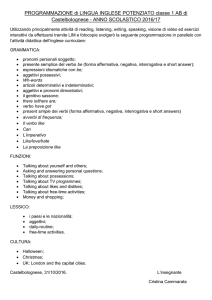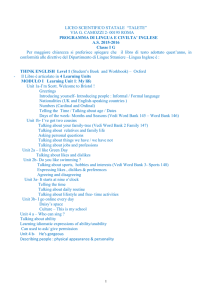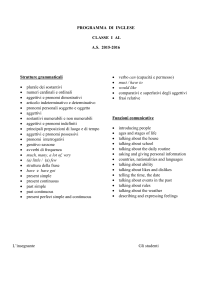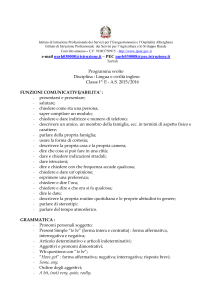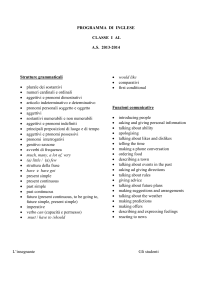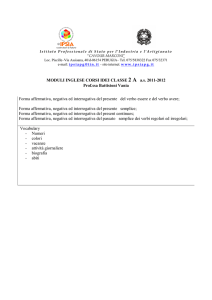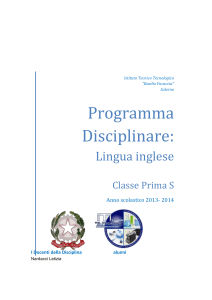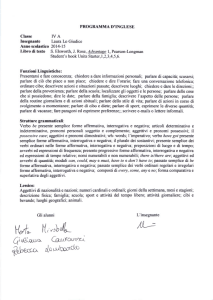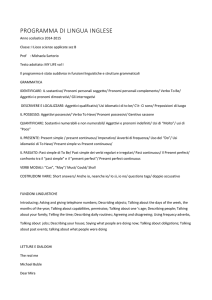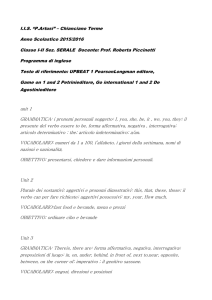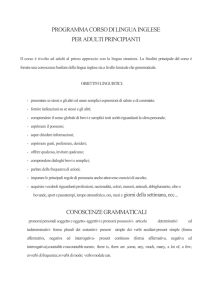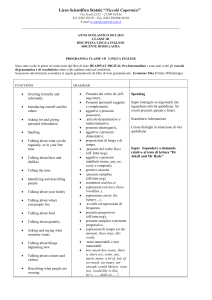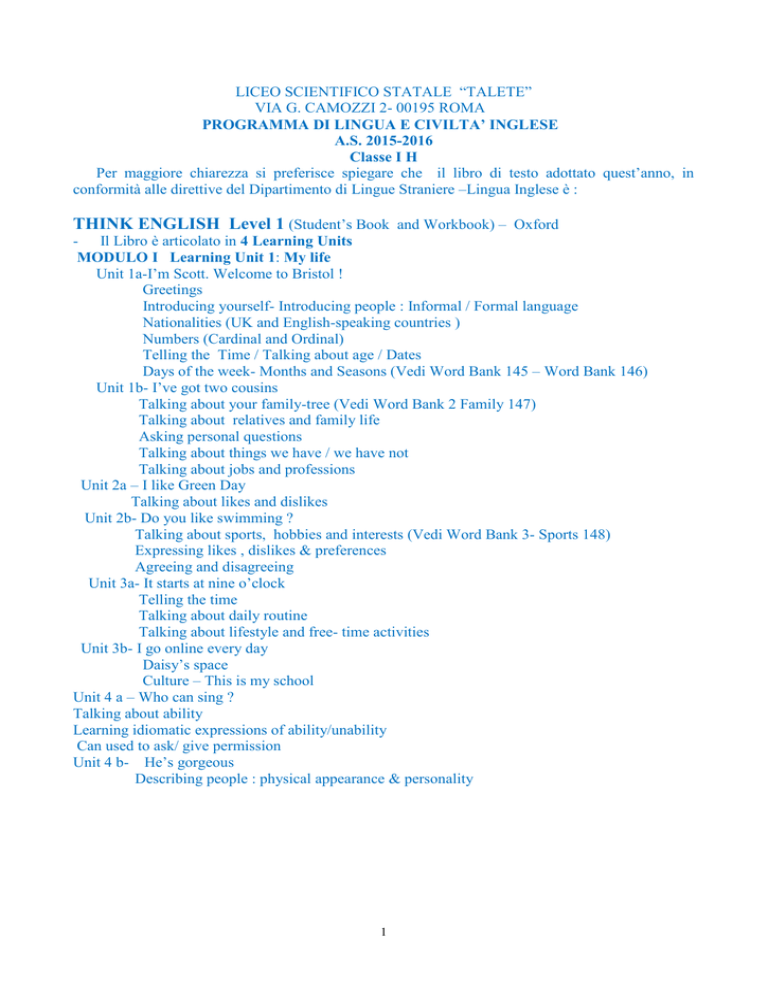
LICEO SCIENTIFICO STATALE “TALETE”
VIA G. CAMOZZI 2- 00195 ROMA
PROGRAMMA DI LINGUA E CIVILTA’ INGLESE
A.S. 2015-2016
Classe I H
Per maggiore chiarezza si preferisce spiegare che il libro di testo adottato quest’anno, in
conformità alle direttive del Dipartimento di Lingue Straniere –Lingua Inglese è :
THINK ENGLISH Level 1 (Student’s Book and Workbook) – Oxford
- Il Libro è articolato in 4 Learning Units
MODULO I Learning Unit 1: My life
Unit 1a-I’m Scott. Welcome to Bristol !
Greetings
Introducing yourself- Introducing people : Informal / Formal language
Nationalities (UK and English-speaking countries )
Numbers (Cardinal and Ordinal)
Telling the Time / Talking about age / Dates
Days of the week- Months and Seasons (Vedi Word Bank 145 – Word Bank 146)
Unit 1b- I’ve got two cousins
Talking about your family-tree (Vedi Word Bank 2 Family 147)
Talking about relatives and family life
Asking personal questions
Talking about things we have / we have not
Talking about jobs and professions
Unit 2a – I like Green Day
Talking about likes and dislikes
Unit 2b- Do you like swimming ?
Talking about sports, hobbies and interests (Vedi Word Bank 3- Sports 148)
Expressing likes , dislikes & preferences
Agreeing and disagreeing
Unit 3a- It starts at nine o’clock
Telling the time
Talking about daily routine
Talking about lifestyle and free- time activities
Unit 3b- I go online every day
Daisy’s space
Culture – This is my school
Unit 4 a – Who can sing ?
Talking about ability
Learning idiomatic expressions of ability/unability
Can used to ask/ give permission
Unit 4 b- He’s gorgeous
Describing people : physical appearance & personality
1
MODULO II Learning Unit 2 : Let’s go out
Di questa unità didattica si è considerato opportuno svolgere prima le Unit 6a/Unit 6b e,
successivamente, le Unit 5a/Unit 5b e e Unit 8a Unit 8b completando le rispettive sezioni
grammaticali con il supporto di Activating Grammar Digital
Unit 6a- I’m not getting angry!
Talking about actions happening at the moment of speaking and around now
What’s happening ?
Special Uses of the Present Continuous Tense :
Talking about intentions/ plans that you are determined to carry out in the near future
Unit 6b- It’s raining
What’s the weather like today ?
Hurricane Charlie
Unit 5a What would you like to do ?
Giving orders/ exhortations
Making, accepting and rejecting suggestions
Unit 5b How much is it ?
Asking and answering about money and prices
Unit 8a 7,000 boxes of strawberries
Talking about quantities.
Unit 8b Whose is the pizza?- The Blue Zone
Making orders in a restaurant- Word Bank- Food & Drink- Restaurant Menus p.187
MODULO III Learning Unit 3 : Friends
Unit 9a How is it going ?
Unit 9b I was at Amy’s House
Talking about the past
Asking /relating past events
Unit 10a My mobile saved my life !
Telling /Writing episodes happened in the past
Unit 10b What did you talk about ?
Questions and short answers
Unit 11a Who smashed the window?
Subject/object questions
MODULO IV Learning Unit 4 : Making plans
Unit 13a What are you going to do?
Talking about future intentions
Unit 14a I’m leaving soon !
Definite future arrangements/
Timetables
2
PARTE II
Per focalizzare l’attenzione sulla struttura della lingua e acquisire la conoscenza degli elementi
base, è stato utilizzato, oltre alla sezione Check Your Grammar del libro di testo,
A. Gallagher- F.Galuzzi
ACTIVATING GRAMMAR DIGITAL EDITION
In conformità alle indicazioni del DIPARTIMENTO DI LINGUA E C. INGLESE, sono stati
esaminati :
I Pronomi Personali ( soggetto e complemento)
il verbo To Be ( Forma aff./ interr./.neg/)- There is /There are
Aggettivi e pronomi dimostrativi This/that -These /Those
Gli aggettivi e pronomi possessivi- il Genitivo Sassone: regola generale e casi particolari
Il doppio genitivo
Wh-questions : Who ? What? - Why ? When?- Where?
Whose ? Which ?
Il verbo To Have: forma affermativa -interrogativa- negativa
got rafforzativo
Differenze fra British English / American English
Significati particolari di to have usato come verbo principale
( to have breakfast; to have lunch; to have dinner; to have a bath
to have a swim -to have a shower- to have a walk/ to have a stroll etc. etc.)
Modals : Can / Could / May / Forme Aff/ Neg.
Imperatives : Forme Aff/ Neg.
Let + personal pronoun + infinitive (Forma Aff/ Neg)
Aggettivi e sostantivi di nazionalità
Aggettivi terminanti in-ed ; ing
I NUMERI: i numeri cardinali- I numeri ordinali- la data- I giorni della settimana- I mesi e le stagioni
GLI AGGETTIVI INDEFINITI
Some, any, no : regola generale
Casi particolari : offerte e richieste
Espressioni di quantità : a lot, much, many, a little, a few, few
I PRONOMI INDEFINITI
Someone /anyone/ noone regola generale
Casi particolari/ avverbi indefiniti
Il PRESENTE
Il Presente Semplice
Forma : affermativa/negativa/ interrogativa
Usi Particolari
-gli avverbi di frequenza- la struttura della frase
I like e verbi seguiti dal gerundio: regola generale e casi particolari (I like +infinito)
I prefer doing
Regola generale+ casi particolari (I prefer seguito da infinito)
I would rather go
Il Presente Progressivo
Forma : affermativa/ negativa/ interrogativa/Uso : Contrasto tra Presente Semplice / Progressivo
Presente progressivo con idea di futuro
Contrasto tra : going to/ presente progressivo con idea di futuro
3
IL PASSATO
Il Passato Semplice di To be
Forma : affermativa/ negativa/ interrogativa/
Il Simple Past dei verbi regolari
Forma affermativa/negativa /interrogativa
Uso : espressioni di tempo/ parti della giornata/ quando si dice o si chiede
quando si è svolta un’azione
Il Passato Semplice di To have
Verbi Irregolari : Vedi lista in appendice a Think English p. 240
The Past Continuous Tense
Forma : affermativa/negativa/interrogativa
Uso : Contrasto tra Passato Semplice/ Passato Progressivo
Il FUTURO
The Simple Future
Il Futuro intenzionale : be going to
Forma : affermativa/ negativa/interrogativa
Uso : progetti/intenzioni o decisioni precedenti al momento in cui si parla
Il Present Simple con valore di futuro : time-tables
Uso : progetti futuri già definiti e prestabiliti nel futuro prossimo
Contrasto tra : going to/ presente progressivo con idea di futuro.
Nel corso dell’a.s.2015-16 gli alunni di questa classe hanno, inoltre, tratto profitto da un ciclo di
8 lezioni con il lettore madrelingua (da metà gennaio alla metà di aprile)che ha permesso loro di
migliorare la loro fluency e ampliare il loro vocabolario attraverso lo svolgimento di pair/ group
activities, listening- comprehension activities games.
Agli alunni di questa classe si consiglia l’ eserciziario sotto elencati per l’estate
Rachel Finnie
GET IT RIGHT 1
HELBLING LANGUAGES- 978-3-902504-53-1
Oppure
Louise Green
CULT HOLIDAY
-978-88-530-1587-7
Si consiglia inoltre la lettura di almeno 2 racconti o romanzi Easy Reader Step Step 2 B1- Black
Cat oppure
Helbling Readers Level 3-4
Roma 30/5/ 2016
L’insegnante
Gli alunni
4
5

